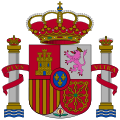- Constitutions of Spain
-
Spain 
This article is part of the series:
Politics and government of
SpainLegislature- Cortes Generales
- Congress of Deputies
- President
- Senate
- President
- Congress of Deputies
- Opposition Leader
- People's Defender
- Court of Accounts
- General Council of the Judiciary
- Supreme Court
- Audiencia Nacional
Divisions- Autonomous
communities- Reg. governments
- Reg. legislatures
- Provinces
- Comarcas
- Municipalities
Foreign policy
Spain's first Constitution was passed in 1812. A list of the different Spanish constitutional laws follows:
Name In force Form of state Democracy Repeal Observations Bayonne Statute
Royal Charter1808–1814 Monarchy Bicameral parliament with semi-elective lower house Spanish War of Independence lost by King Joseph Bonaparte Not recognized by the Spanish patriots during the war. Most of its contents were to be enacted through the 1810s, so it did not actually work. Cádiz Constitution 1812-1814
1820-1823
1836-1837Monarchy Elected parliament King Ferdinand VII reinstated absolutism in 1814 and again in 1820. Superseded in 1837. The Crown was granted wide-ranging veto powers, which Ferdinand VII used to prevent the liberal governments from functioning. Royal Statute
Royal Charter1834–1836 Monarchy Bicameral parliament with elected lower house and appointed Senate Regent forced to reinstate the 1812 Constitution after a military pronunciamiento. Granted by Regent Maria Christina in order to get support from the liberals in the First Carlist War 1837 Constitution 1837–1845 Monarchy Superseded Partially suspended by Regent Baldomero Espartero to rule by decree between 1840 and 1843. 1845 Constitution 1845–1869 Monarchy Parliament elected by censitary suffrage Queen Isabella II and her Government overthrown in the Glorious Revolution of 1868 Unborn (1856) Constitution Never Monarchy Parliament elected by censitary suffrage Scrapped by new Government Passed by the Parliament but not enacted by the Queen as moderate liberals returned to power. Glorious Revolution Constitution 1869–1876 Monarchy Parliament elected by universal male suffrage Republic declared by the Cortes after resignment of King Amadeo I Draft First Republic Constitution Never Federal Republic Unicameral parliament elected by universal male suffrage General Arsenio Martínez Campos led a successful pronunciamiento restoring the Bourbon monarchy. Republic collapsed before even passing the Constitution, mainly due to wide disagreement over the federalism vs centralism issue. Restoration Constitution 1876–1931 Monarchy Parliament elected, first by censitary, then universal male suffrage from the 1890s Republic instated after King Alphonse XIII fled Spain. While theoretically democratic, elections were routinely rigged by the governing party, and in practice power was shared by two alternating parties (the turno system). During Primo de Rivera's dictatorship (1923–1930) many of its articles were suspended in a de facto dictatorship. Second Republic Constitution 1931–1939 Semi-federal Republic Unicameral parliament, first with universal male suffrage, then female suffrage from 1933 Civil War lost by the Republican side. During the Civil War (1936–1939) it was abolished by the Nationalists and widely disregarded in the Republican zone Fundamental Laws of the Kingdom
Dictator Fueros1938–1978 Dictatorship
Theoretically, monarchyPartially-elected unicameral parliament with small power of its own By Parliament: the Law for Political Reform, last of the Fundamental Laws, started the Spanish transition to democracy. A set of laws progressively enacted by the dictator Francisco Franco as fueros for the Spanish People. The individual laws are: Fuero del Trabajo (1938), Ley Constitutiva de las Cortes (1942), Fuero de los Españoles (1945), Ley del Referéndum Nacional (1945), Ley de Sucesión en la Jefatura del Estado (1945), Ley de Principios del Movimiento Nacional (1958), Ley Orgánica del Estado (1967) and Ley de Reforma Política (1977). 1978 Constitution 1978–present Monarchy Parliamentary democracy with bicameral, elective parliament Currently in force, though talks for reform are common in Spanish politics First in Spanish constitutional history not to grant any emergency power (i.e. sacking the PM, dissolving the Cortes) to the Head of State.
During Franco's dictatorship, there were many attempts to create stable institutions that did not (at least directly) emanate from the dictator as they did in the post-war period. The Fundamental Laws of the Kingdom (Spanish Leyes Fundamentales del Reino) were a constitution in parts enacted through nearly 20 years starting in the 1950s. They established the very institutions that would later, under King Juan Carlos I and Prime Minister Adolfo Suárez, commit "constitutional suicide" and pass the Political Reform Act, starting the Spanish transition to democracy. Most of those Laws theoretically provided for a quite free state, much in the fashion the Soviet constitutions granted many freedoms, but ultimately the power of the Caudillo was supreme.External links
States with limited
recognition- Abkhazia
- Kosovo
- Nagorno-Karabakh
- Northern Cyprus
- South Ossetia
- Transnistria
Dependencies
and other territoriesOther entities - European Union
- Sovereign Military Order of Malta
Categories:- Constitutions of Spain
- European government stubs
- Spain politics stubs
- Cortes Generales
Wikimedia Foundation. 2010.
